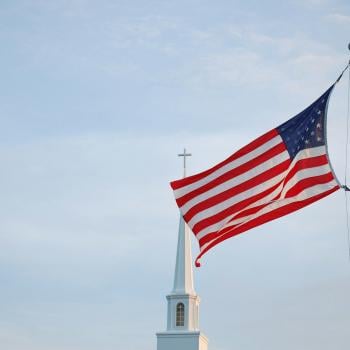I arrive at no breakthrough, no . . . solution. And yet I'm not sure I want one, because there seems to be something grotesque at the heart of this project: Rattled by what evil has done, I've been trying to "make sense" of what happened. I've been trying to solve the x that has lodged itself in my system of beliefs. My considerations have been absorbed by theory and, worse, they have been primarily about me, derived from a selfish wish for my faith to remain unshaken.
Belatedly, I understand what folly this is. In the aftermath of a raping, pillaging, and burning; in the aftermath of genocide, a tsunami, or an earthquake, what could possibly make sense?
The lowest evil is like the highest love: it is mystery. We try in vain to solve it, and it is not our place. Our mission is something much different precisely because faith is not like mathematics. We are called, of course, to pray for the sufferer. But more fundamentally we are called, even in our poverty of experience and empathy, to be with the sufferer, in the words of Pope Benedict, to "take up his suffering in such a way that it becomes mine also."
For most of us, the only avenue to this solidarity is prayer. Most will never reach the depths of anguish felt by Dr. Petit and his family or countless other human beings who have faced, and will continue to face, the worst that life can bring. But in our prayer, we can say, "Lord, let me be with them. In the way and to the degree you wish, make their suffering my own."
In this way, and while admittedly falling short, we seek to model the path taken by Our Lord. As Christ came to suffer with and for us, so too we seek to suffer—to take up our cross—with and for others.
And what of our long list of beliefs and the desire for certainty? When we let the mystery of evil open us more fully to the mystery of love, that need goes away. On this point, I am edified by the words of the great Catholic historian Eamon Duffy, from his Faith of Our Fathers.
Looking back on his own dark night, occasioned by the death of a good friend, Duffy wrote:
[N]ow I know that faith is a direction, not a state of mind; states of mind change and veer about, but we can hold a direction. . . . The difference between a believer and a non-believer is not that the believer has one more item in his mind, in his universe. It is that the believer is convinced that reality is to be trusted, that in spite of appearances the world is very good.
Throughout the course of our lives, that statement—"the world is very good"—can strike us as absurd, so thoroughly can circumstances suggest the opposite. And I am still struggling to think of faith as a direction and not a state of mind. But I find that in Dr. Petit we are given a model, a brave and heroic model, for what it means to hold a direction:
"I push forward," he told the court, "in the hope that good will overcome evil and feel the need to tell the world that evil lives among us and we need to rid the world of it."
May God be with him, and all of us.




